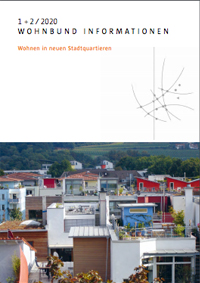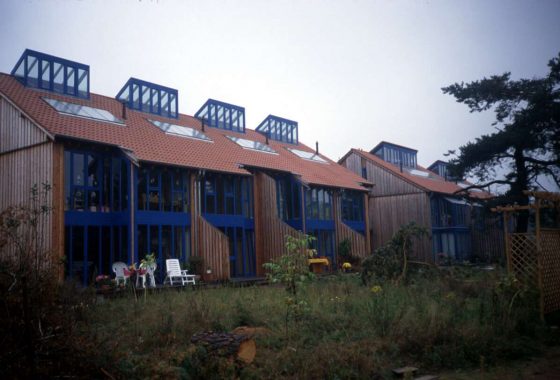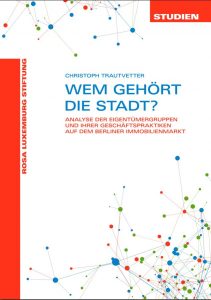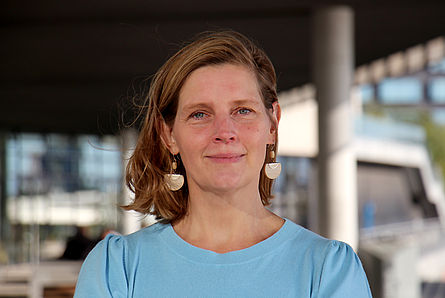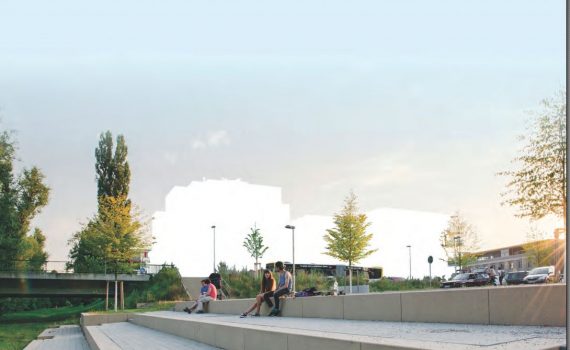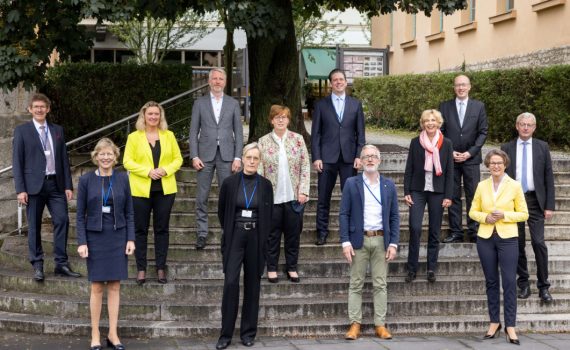 Forestry Minister Peter Hauk MdL: "With our call for ideas, we want to further promote municipal timber construction in the state and further consolidate our nationwide position as the No. 1 timber construction state".
A total of around 6.5 million euros in funding from the Baden-Württemberg timber construction campaign is available for the call for ideas for municipal timber construction concepts. The online application deadline is 12 February 2020.
Forestry Minister Peter Hauk MdL: "With our call for ideas, we want to further promote municipal timber construction in the state and further consolidate our nationwide position as the No. 1 timber construction state".
A total of around 6.5 million euros in funding from the Baden-Württemberg timber construction campaign is available for the call for ideas for municipal timber construction concepts. The online application deadline is 12 February 2020.
Kategorie für Blog: Typology
Constance receives project funding for "Hafner KliEn" from the 7th Energy Research Programme of the Federal Government The city of Constance is striving for sustainable urban development. This should include consideration of the triad of sufficiency, efficiency and substitution in the area of energy policy decisions and climate protection. This also and especially applies to the new city district [...].
 On the occasion of the meeting of EU Ministers for Urban Development and Territorial Cohesion on the "New Leipzig Charter", Daniela Wagner, spokesperson for urban development for Alliance 90/The Greens in the German Bundestag, explains:
We welcome the "New Leipzig Charter". Without the transformative power of cities and the ideas and drive of their residents, we will not be able to overcome the challenges of the climate crisis. Nevertheless, the Charter contains significant gaps. The guiding principle of the resilient city is missing. The development of robust and resilient cities is important in order to better assess risks and recognise and prevent dangers in good time. The guiding principle of the healthy city is also not mentioned - despite the heatwaves caused by the climate crisis, a never-ending stream of air pollutants from fossil fuelled combustion engines and the current challenge of a global pandemic.
On the occasion of the meeting of EU Ministers for Urban Development and Territorial Cohesion on the "New Leipzig Charter", Daniela Wagner, spokesperson for urban development for Alliance 90/The Greens in the German Bundestag, explains:
We welcome the "New Leipzig Charter". Without the transformative power of cities and the ideas and drive of their residents, we will not be able to overcome the challenges of the climate crisis. Nevertheless, the Charter contains significant gaps. The guiding principle of the resilient city is missing. The development of robust and resilient cities is important in order to better assess risks and recognise and prevent dangers in good time. The guiding principle of the healthy city is also not mentioned - despite the heatwaves caused by the climate crisis, a never-ending stream of air pollutants from fossil fuelled combustion engines and the current challenge of a global pandemic.
 The ecological model settlement on a former barracks site in Munich sets new standards in timber construction. Various timber construction methods and building types up to seven storeys are being tested side by side in eight building projects with the aim of a final scientific evaluation. Timber frame, timber frame and timber hybrid construction methods are being used.
The ecological model settlement on a former barracks site in Munich sets new standards in timber construction. Various timber construction methods and building types up to seven storeys are being tested side by side in eight building projects with the aim of a final scientific evaluation. Timber frame, timber frame and timber hybrid construction methods are being used.
 Since April 2020, the Öko-Institut has been conducting research into how urban neighbourhoods can be sustainably transformed, using two neighbourhoods in the swarming city of Darmstadt as examples, in the project Transformative Strategies for Integrated Neighbourhood Development (TRASIQ 2). The Federal Ministry of Education and Research is funding the project, which is led by the Öko-Institut and involves the City of Darmstadt, the Institute for Regional and Urban Development Research (ILS) and the "Team Ewen" agency.
Since April 2020, the Öko-Institut has been conducting research into how urban neighbourhoods can be sustainably transformed, using two neighbourhoods in the swarming city of Darmstadt as examples, in the project Transformative Strategies for Integrated Neighbourhood Development (TRASIQ 2). The Federal Ministry of Education and Research is funding the project, which is led by the Öko-Institut and involves the City of Darmstadt, the Institute for Regional and Urban Development Research (ILS) and the "Team Ewen" agency.
Mobility, heat and living space
The project focuses on the research topics of mobility, heat supply and efficient use of living space. Heat supply is an important key to climate-friendly living. How and where, for example, can district heating be expanded in existing properties? How can we increase the share of renewable energies in the heat supply? The size of the living space also contributes to how environmentally friendly a person lives. What needs to be done to ensure that people have the living space they need in their particular phase of life through intelligent apartment swaps? How can neighbourhoods be redesigned so that residents can organise their mobility ecologically? Dr. Kirsten David, a researcher at HafenCity University (HCU) Hamburg, has developed an innovative method for determining rent increases after energy efficiency measures: By means of functional cost splitting, rent increases become appropriate and comprehensible. The planning of the energetic measures is also ecologically optimized. For her dissertation entitled "Functional Cost Splitting for the Determination of Rent Increases after Energy Efficiency Measures", the scientist today receives the "BUND Research Award 2020". With the research award, the Bund für Umwelt- und Naturschutz (BUND) honors scientific work on sustainable development.
Dr. Kirsten David, a researcher at HafenCity University (HCU) Hamburg, has developed an innovative method for determining rent increases after energy efficiency measures: By means of functional cost splitting, rent increases become appropriate and comprehensible. The planning of the energetic measures is also ecologically optimized. For her dissertation entitled "Functional Cost Splitting for the Determination of Rent Increases after Energy Efficiency Measures", the scientist today receives the "BUND Research Award 2020". With the research award, the Bund für Umwelt- und Naturschutz (BUND) honors scientific work on sustainable development.
 Wohnungsbaugenossenschaft Neues Berlin and Berliner Stadtwerke have agreed on another joint tenant power project. Six solar power systems with an output of around 500 kilowatts are being built in the Mühlengrund housing estate in Hohenschönhausen. Tenants of more than 1,100 apartments will soon be able to benefit from green electricity from their own roofs.
Wohnungsbaugenossenschaft Neues Berlin and Berliner Stadtwerke have agreed on another joint tenant power project. Six solar power systems with an output of around 500 kilowatts are being built in the Mühlengrund housing estate in Hohenschönhausen. Tenants of more than 1,100 apartments will soon be able to benefit from green electricity from their own roofs.
 Glaciers are melting, sea levels are rising, heat waves and heavy rainfall are increasing: The consequences of climate change are visible and tangible worldwide, and the window of opportunity to act is shrinking. In order to significantly limit the global effects of climate change, the emission of greenhouse gases on earth must be drastically reduced. The agreement reached by the international community in Paris in 2015 sets the goal of limiting global warming to well below 2 degrees Celsius, but preferably to 1.5 degrees Celsius. Now, the Wuppertal Institute presented a study with possible cornerstones that can help to achieve the 1.5 degree target by 2035. The study shows that a climate-neutral energy system by 2035 is very ambitious, but in principle feasible, provided that all possible strategies from today's perspective are bundled. This requires, above all, bringing forward and intensifying measures that are described in many studies as necessary to achieve greenhouse gas neutrality by 2050.
Glaciers are melting, sea levels are rising, heat waves and heavy rainfall are increasing: The consequences of climate change are visible and tangible worldwide, and the window of opportunity to act is shrinking. In order to significantly limit the global effects of climate change, the emission of greenhouse gases on earth must be drastically reduced. The agreement reached by the international community in Paris in 2015 sets the goal of limiting global warming to well below 2 degrees Celsius, but preferably to 1.5 degrees Celsius. Now, the Wuppertal Institute presented a study with possible cornerstones that can help to achieve the 1.5 degree target by 2035. The study shows that a climate-neutral energy system by 2035 is very ambitious, but in principle feasible, provided that all possible strategies from today's perspective are bundled. This requires, above all, bringing forward and intensifying measures that are described in many studies as necessary to achieve greenhouse gas neutrality by 2050.
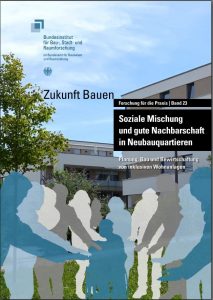 The Institute for Urban Planning and Social Research WEEBER+PARTNER (Stuttgart) examined 16 case studies and interviewed responsible persons in municipal, cooperative and private housing companies. The projects are characterized by a wide range of planning and construction approaches. According to the study, social diversity requires structural diversity: Rental, social and owner-occupied apartments of different sizes and with diverse layouts were created in the new housing quarters. They are socially mixed - even within buildings - with the respective proportions in the neighbourhood being derived from local requirements. The new quarters also offer space for communal forms of living, for example for older people and those in need of care. And they are characterised by an attractively designed and green residential environment. Concept awards promote the planning and implementation of such projects: Through them, plots of land are not allocated according to the highest price, but for the best concept.
The Institute for Urban Planning and Social Research WEEBER+PARTNER (Stuttgart) examined 16 case studies and interviewed responsible persons in municipal, cooperative and private housing companies. The projects are characterized by a wide range of planning and construction approaches. According to the study, social diversity requires structural diversity: Rental, social and owner-occupied apartments of different sizes and with diverse layouts were created in the new housing quarters. They are socially mixed - even within buildings - with the respective proportions in the neighbourhood being derived from local requirements. The new quarters also offer space for communal forms of living, for example for older people and those in need of care. And they are characterised by an attractively designed and green residential environment. Concept awards promote the planning and implementation of such projects: Through them, plots of land are not allocated according to the highest price, but for the best concept.
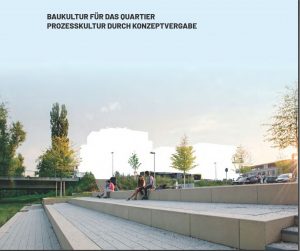 Conceptual procedures are increasingly establishing themselves as a further instrument of municipal land policy for locations with development potential. Here, the property is not allocated according to the highest price, but according to the concept that promises the most sustainable approaches to the further development of the neighbourhood. In this way, the procedures offer municipalities approaches to solving two current and urgent problems: the need for high-quality urban development and affordable housing.
Conceptual procedures are increasingly establishing themselves as a further instrument of municipal land policy for locations with development potential. Here, the property is not allocated according to the highest price, but according to the concept that promises the most sustainable approaches to the further development of the neighbourhood. In this way, the procedures offer municipalities approaches to solving two current and urgent problems: the need for high-quality urban development and affordable housing.
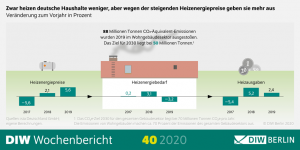 Annual DIW Heat Monitor based on data from energy service provider ista Deutschland GmbH: Heating energy demand in residential buildings declines again for the first time since 2015 - Rising prices, however, cause heating expenditure to increase by 2.4 percent - CO2emissions have fallen by 21 percent overall since 2010, but by only 2.6 percent when adjusted for temperature - Energy-efficient renovation in residential buildings almost stagnant
Annual DIW Heat Monitor based on data from energy service provider ista Deutschland GmbH: Heating energy demand in residential buildings declines again for the first time since 2015 - Rising prices, however, cause heating expenditure to increase by 2.4 percent - CO2emissions have fallen by 21 percent overall since 2010, but by only 2.6 percent when adjusted for temperature - Energy-efficient renovation in residential buildings almost stagnant
UmweltBank has acquired the former GfK site on Nuremberg's Nordwestring. The company is planning an ecologically and socially sustainable urban quarter with housing, a daycare center, commercial space and public green areas. The new headquarters of the green bank will also be part of the quarter. The previous owner, a joint venture of Pegasus Capital Partners and Art-Invest Real Estate, had already developed an urban development concept in recent years and coordinated it with the City of Nuremberg. UmweltBank would like to further develop this concept in line with its own requirements in close cooperation with the city.
Jury statement: "The WIR neighbourhood in Berlin is characterised not only by its high energy efficiency (KfW 40 standard) and the use of wood as a renewable raw material for the building construction, but also by the collaborative planning process, which led to different housing concepts and the integration of different social communities. Communal areas and shared facilities such as a residents' workshop, swimming pool, neighbourhood square and daycare centre enable a lively and diverse neighbourhood. This also includes a dementia residential community as well as organisations for youth work and refugee groups. The five apartment blocks were realised with a timber frame construction and the façade in timber panel construction. This resulted in flexible floor plans that offer good conversion options."
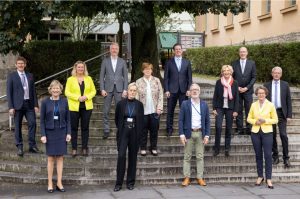 At their meeting in Weimar on 24 and 25 September, the construction ministers of the federal states adopted resolutions on social housing, the use of ecological building materials and the digitalisation of the building permit process, among other things.
The EU's plan to become involved in the area of public housing promotion as part of the new "InvestEU" fund was criticised. The federal government was therefore called upon to advocate a modification of the programme so that subsidies are only granted if the provisions of regional, national or federal funding regimes are observed, in particular if rent and occupancy restrictions are stipulated. The Chairman of the Conference of Building Ministers, Thuringia's Infrastructure Minister Benjamin-Immanuel Hoff, said: "Creating affordable housing in Germany remains an important task. The federal government must continue to provide at least the same level of funding. In order to make faster progress, we need more money in the system. The EU's commitment is therefore to be welcomed in principle. But we must ensure that the funds also reach social housing construction, and we agree that this can best be achieved through the established funding programmes of the federal states."
At their meeting in Weimar on 24 and 25 September, the construction ministers of the federal states adopted resolutions on social housing, the use of ecological building materials and the digitalisation of the building permit process, among other things.
The EU's plan to become involved in the area of public housing promotion as part of the new "InvestEU" fund was criticised. The federal government was therefore called upon to advocate a modification of the programme so that subsidies are only granted if the provisions of regional, national or federal funding regimes are observed, in particular if rent and occupancy restrictions are stipulated. The Chairman of the Conference of Building Ministers, Thuringia's Infrastructure Minister Benjamin-Immanuel Hoff, said: "Creating affordable housing in Germany remains an important task. The federal government must continue to provide at least the same level of funding. In order to make faster progress, we need more money in the system. The EU's commitment is therefore to be welcomed in principle. But we must ensure that the funds also reach social housing construction, and we agree that this can best be achieved through the established funding programmes of the federal states."
Following the interim results of the Housing Summit and the Building Land Commission, demands are being voiced by the scientific community: The still tight housing markets require the use of additional instruments by the federal and state governments. Otherwise, the turnaround towards affordable housing cannot be achieved.
Offensive for green electricity: Installation of 1,000 new photovoltaic systems and 2,000 charging points in Deutsche Wohnen neighbourhoods
"The building sector is responsible for around one third of all CO2-emissions in Germany. To achieve a climate-neutral building stock by 2050, the energy refurbishment of existing buildings alone is not enough," explains Michael Zahn, CEO of Deutsche Wohnen SE. "We also need to exploit the technological possibilities for CO2-Reduction to the fullest and open up the opportunity for our tenants to live sustainably."The popular ESA dormitory on the campus of the TU Kaiserslautern (TUK) is in great need of renovation. The foundation's renovation concept for TUK envisions the former experimental building becoming a CO2-neutral building. The estimated costs for the work have not yet been fully raised. Therefore, the ESA residents are participating with a crowdfunding campaign, which has been available on the Startnext platform since September 13.
"The world's water resources are currently facing the greatest threat in the history of mankind," write aquatic ecologists in their recently published statement paper. More than one hundred professional societies of aquatic ecosystem research around the globe have signed the joint statement. In it, the researchers show the dramatic effects that climate change is having on aquatic ecosystems worldwide. They call for immediate concerted action by politics, business, science and society to halt the progress of climate change.
 The city is to become cleaner and quieter: Under the heading "blue_village_Franklin", important future topics such as new mobility, energy efficiency, climate-optimised living or smart grids are being tested with the conversion of the former military area FRANKLIN. The SQUARE project, two model houses renovated according to the latest energy standards, and the electromobile bus lines 66 and 67 are part of this master plan. Franz Untersteller MdL, State Minister for the Environment, Climate and Energy Management, visited the two model projects in the new urban quarter on Tuesday, 4 August, as part of his summer tour "Environmental Future".
The city is to become cleaner and quieter: Under the heading "blue_village_Franklin", important future topics such as new mobility, energy efficiency, climate-optimised living or smart grids are being tested with the conversion of the former military area FRANKLIN. The SQUARE project, two model houses renovated according to the latest energy standards, and the electromobile bus lines 66 and 67 are part of this master plan. Franz Untersteller MdL, State Minister for the Environment, Climate and Energy Management, visited the two model projects in the new urban quarter on Tuesday, 4 August, as part of his summer tour "Environmental Future".
Via the new feature you will get a message by email when there are new posts in the sdg21.web database. sdg21 news subscription Sent with the latest content weekly on Tuesday at 9:00 am when there is something new on sdg21.eu. All subscription options can be found at: http://sdg21.eu/sdg21-news-abonnieren
Short video about the DGNB system for districts in the 2020 version. Which criteria are relevant? Which types of neighbourhoods can be certified according to DGNB?
Climate protection is important to over 80 percent of Germans - but this should not be reflected in higher rental costs. In order to increase the acceptance of energy-efficient renovations, Deutsche Wohnen has developed a model of how climate protection and social compatibility can come together. The "Concept for Socially Compatible Climate Protection in the Building Sector" aims to significantly increase the rate of refurbishment in existing buildings in order to achieve national climate protection targets. At the same time, an economic stimulus package worth billions is being initiated.
On 18 June 2020, the German Bundestag passed the Building Energy Act (GEG) in its third reading. With this law, the federal government is combining the existing requirements of the Energy Saving Ordinance (EnEV), the Renewable Energies Heat Act (EEWärmeG) and the Energy Saving Act (EnEG). For the information programme Zukunft Altbau (Future of Old Buildings), which is supported by the Baden-Württemberg Ministry of the Environment, the specifications of the new law are not ambitious enough. To bring climate-friendly building and renovation nationwide on the way is not possible in the future. "The legislator has missed it to introduce more demanding standards," says Frank Hettler of Zukunft Altbau. "For a sustainable building stock in Germany, however, these are urgently needed to achieve the climate targets." The GEG will now be forwarded to the Bundesrat, which, however, does not require approval, and is expected to come into force by the end of the year.
 Zur heutigen Kabinettssitzung und der dabei geplanten Befassung mit dem Entwurf eines Deutschen Ressourceneffizienzprogramms III (ProgRess III) erklären Dieter Janecek, Sprecher für Industriepolitik und digitale Wirtschaft, und Dr. Bettina Hoffmann, Sprecherin für Umweltpolitik und Umweltgesundheit:
Mit ProgRess III tritt die Bundesregierung auf der Stelle. Zwei Ressourceneffizenzprogramme der Bundesregierung konnten nicht verhindern, dass der deutsche Rohstoffverbrauch weiterhin steigt. Es ist absehbar, dass auch das dritte Ressourcenprogramm der Bundesregierung daran nichts ändert. Auch ProgRess III bleibt ein längliches Sammelsurium von Plänen, Ankündigungen und Prüfaufträgen.
Zur heutigen Kabinettssitzung und der dabei geplanten Befassung mit dem Entwurf eines Deutschen Ressourceneffizienzprogramms III (ProgRess III) erklären Dieter Janecek, Sprecher für Industriepolitik und digitale Wirtschaft, und Dr. Bettina Hoffmann, Sprecherin für Umweltpolitik und Umweltgesundheit:
Mit ProgRess III tritt die Bundesregierung auf der Stelle. Zwei Ressourceneffizenzprogramme der Bundesregierung konnten nicht verhindern, dass der deutsche Rohstoffverbrauch weiterhin steigt. Es ist absehbar, dass auch das dritte Ressourcenprogramm der Bundesregierung daran nichts ändert. Auch ProgRess III bleibt ein längliches Sammelsurium von Plänen, Ankündigungen und Prüfaufträgen.
The parliament of Bremen wants to oblige the use of solar energy on all new and existing buildings in Bremen and Bremerhaven. Whenever the roof surface is completely renewed, they are to be equipped with a solar system in the future. This is photovoltaics and, if necessary, also solar thermal energy. The Senate is currently examining the latter.
Seit Ende Februar 2020 gilt der Mietendeckel in Berlin und der zeigt mittlerweile Wirkung: um 8% sind die Angebotsmieten für gedeckelte Bestandswohnungen im Schnitt gesunken, dagegen sind die Preise für nicht unter die Vorgaben fallenden Neubauten um 17% angestiegen.
State government launches climate protection support programme for citizens
Environment Minister Jan Philipp Albrecht today presented the state's new funding programme for private investment in climate protection. It starts on Tuesday, 9 June, and includes a bundle of support measures. Funding is available for the purchase of cargo bikes, e-charging stations, electricity storage systems, photovoltaic balcony systems, solar thermal systems, non-fossil heating systems and rainwater cisterns. The installation of a district heating connection and the installation of a green roof are also subsidised. Now that almost all 570 flats in Germany's largest timber-built housing estate in Prinz-Eugen-Park have been occupied, the Munich planning committee has recommended realising the timber-built follow-up project "Kreativquartier" with 370 residential units.
Here are the key data:
http://sdg21.eu/db/kreativquartier
Now that almost all 570 flats in Germany's largest timber-built housing estate in Prinz-Eugen-Park have been occupied, the Munich planning committee has recommended realising the timber-built follow-up project "Kreativquartier" with 370 residential units.
Here are the key data:
http://sdg21.eu/db/kreativquartier
Council of Ministers approves bill to amend state building code
In its meeting on 26 May 2020, the Rhineland-Palatinate Council of Ministers approved in principle a draft bill to amend, among other things, the Rhineland-Palatinate Building Code. The amendment of the state building code is intended to implement changes to the so-called model building code that have already been adopted or are in preparation. To ensure that significantly more houses in Hamburg are greened with plants on roofs and facades, the environmental authority is making €500,000 in funding available from 1 June. A maximum of € 100,000 and up to 40 % of the costs, applicants can receive in future in grants. Applications can be made from construction costs of €1,000. Funding will be provided for ground and wall-based greening of new and existing buildings, preparatory work, climbing aids, plants, planting measures, irrigation systems, completion maintenance and the ancillary costs for professional planning and supervision.
To ensure that significantly more houses in Hamburg are greened with plants on roofs and facades, the environmental authority is making €500,000 in funding available from 1 June. A maximum of € 100,000 and up to 40 % of the costs, applicants can receive in future in grants. Applications can be made from construction costs of €1,000. Funding will be provided for ground and wall-based greening of new and existing buildings, preparatory work, climbing aids, plants, planting measures, irrigation systems, completion maintenance and the ancillary costs for professional planning and supervision.



